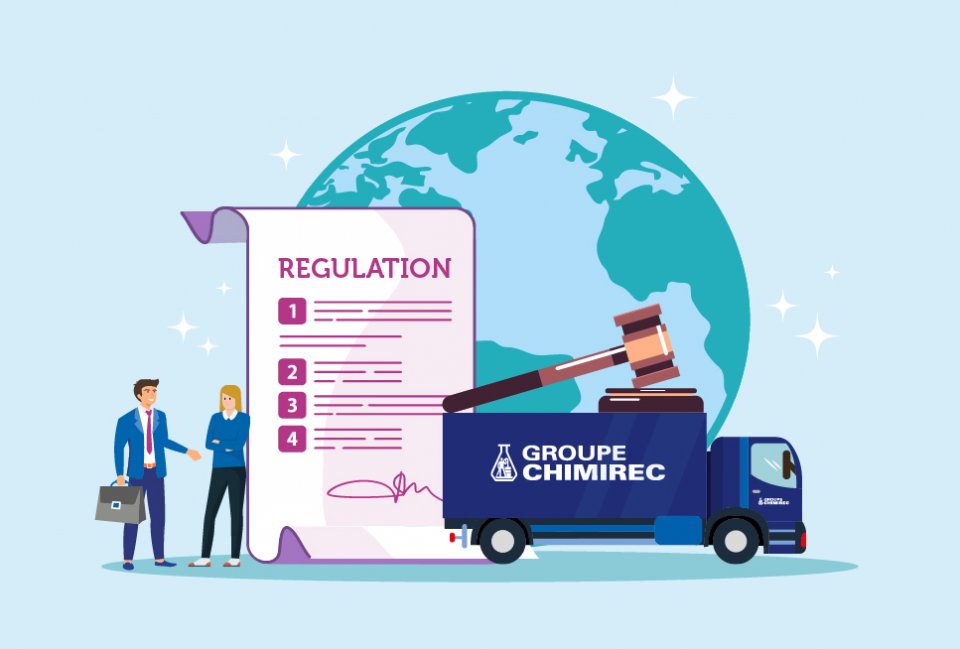Hazardous waste management: stricter international regulations

Responsible, virtuous waste management is a major pillar of environmental and health issues worldwide. It is up to each country to commit to this approach, by introducing local regulations. The CHIMIREC Group welcomes the strengthening of legislation and its application in the countries where its subsidiaries are based.
Exporting CHIMIREC's expertise
Since its creation in 1958 and its first garage oil collection activities, the CHIMIREC Group has been convinced of the need to protect the environment from hazardous waste, which is both a source of pollution for ecosystems and a potential risk to human health.
The decades that followed have amply justified the CHIMIREC Group: legislation was passed in France and then at the European level, and we have witnessed a growing awareness of the need to protect our planet and preserve its natural resources.
Building on its skills and experience, the CHIMIREC Group set out in 2004 to transfer its know-how beyond France's borders and support other countries in their environmental initiatives. The Group set up its first international subsidiary in Poland then Canada, Turkey and Morocco.
Our safety and traceability ethic
Abroad, whatever the regulations in place, the CHIMIREC Group has applied the same level of requirements and the same values that have built its reputation as an expert in France in the field of hazardous waste management.
In the countries where the CHIMIREC Group operates, our subsidiaries are recognised for their professionalism, transparency and strict compliance with regulations.
Our commitment to traceability implies extreme rigour in the identification of waste and in the administrative management of its treatment. This is a guarantee that our international subsidiaries can provide to their customers. And more and more of them are demanding it, especially as waste management laws are being introduced and strengthened.
Regulations: defences against environmental and health risks
While global environmental challenges call for regulatory standardisation at international level, this is not yet the case.
In France, the management of hazardous waste is regulated by a number of laws and regulations, including the Environmental Code, the Public Health Code and the Labour Code. The transport of hazardous waste is also subject to specific regulations.
- In 1975, the first law on waste disposal and recovery introduced the principle of waste producer responsibility and created the first waste management planning tools
- In 1992, a new law reinforced the principle of waste producer responsibility and introduced a hierarchy of waste treatment methods (prevention, reuse, recycling, energy recovery and dispo
- Then, in 2008, the law on environmental liability introduced the principle of full compensation for environmental damage caused by human activities, including waste.
- Since January 1st, 2022, the decree 2021-321, resulting from the AGEC Law (anti-waste for a circular economy), imposes the dematerialisation of the traceability of hazardous waste through the Trackdéchets platform. Producers, hauliers, collectors, treatment sites and outlets must now use this platform to replace the paper waste tracking slips (BSD and BSDA - Bordereaux de Suivi des Déchets). Such a system guarantees seamless traceability of hazardous waste.
Positive developments internationally
For many countries, the implementation of an environmental protection policy is relatively recent compared to France. Nevertheless, regulations on waste management are increasingly becoming a key priority.
Here are just a few examples:
- In Poland
In line with European legislation, the Polish authorities have stepped up their controls to combat illegal landfills of hazardous waste, which pollute the environment and present real health risks.
- In Turkey
Any company that collects hazardous waste must now ensure that it is treated. Single transit activity is now prohibited. With this new law in force since January 2024, the government aims to eliminate any risk of an "ecological bomb". In recent years, Turkey has seen a growing and worrying number of fires at waste transit centres. The government has therefore taken this drastic measure, albeit to the detriment of waste producers who, even for very small quantities of hazardous waste, now must find and work with companies capable of treating their waste, sometimes hundreds of kilometres away from their plants.- In Morocco
Since 2006, Law 28-00 has regulated waste management and disposal. Moreover, this sector of activity is subject to increasingly frequent checks to ensure compliance with the regulations in force. The founding principle is simple: when it comes to hazardous industrial waste, all waste generators are obliged to have their waste processed by a platform authorised by the Ministry for Energy Transition and Sustainable Development. The aim is to ensure end-to-end traceability of waste through to disposal.
Published : 2024-04-23

